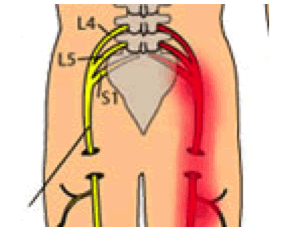
Inflammatory cytokines are implicated in the painful symptoms of sciatica, a common form of lumbar radiculopathy associated with intense pain and dysfunction. Case reports have suggested that TNF inhibitors may improve pain in individuals with sciatica. However, since sciatica is often self-limited, uncontrolled reports of efficacy may be misleading. Here, Genevay et al (Arthritis Rheum 2010; 62(8): 2339) report the findings of a randomized, blinded, placebo-controlled trial of the TNF inhibitor adalimumab in individuals with acute and severe sciatica.
Methods
In this multicenter clinical trial conducted in Switzerland, adults with radiating leg pain in the L4-S1 dermatomal distribution lasting < 12 weeks, with severe pain based on the Oswestry Disability Index, and inadequate pain management using conservative methods (I.e. opioids and glucocorticoids), were randomized to receive 2 injections of adalimumab (40 mg per injection) or comparable placebo separated by 7 days. Participants and staff were blinded to treatment allocation. Patients were followed for change in leg pain (recorded by the participant on a 0-100 visual analogue scale) for the first 10 days, and at weeks 6 and 24. Other outcomes studied were low back pain, disability, quality of life, and the need to undergo back surgery.
Results
Among 265 screened patients, 61 were eligible and randomized. Most were male (57%) and approximately 50 years of age. The mean duration of sciatica was about 3.5 weeks. Most had prior back pain and had stopped working due to sciatica symptoms. Groups were balanced on baseline characteristics. All of the patients allocated to adalimumab, and 26 allocated to placebo completed the study.
Leg pain improved with time in both groups; however, there were early (during the first 2 days after the first injection) and late (at 24 weeks) differences in leg pain favoring the adalimumab group. However, between days 3 and 42, there were no differences in leg pain between the two groups. Improvements in back pain were more pronounced in the adalimumab group across the entire study time course, and were significantly lower at most time points in the adalimumab group. At 6 months, 65% of patients in the adalimumab group were considered responders for change in back pain, compared to only 27% of the placebo group (p<0.01). There were no emergency surgeries performed; however, 7 of the adalimumab treated patients compared to 18 of the placebo treated patients underwent surgery (p=0.04).
Conclusions
Compared to placebo, two injections of adalimumab improved back pain, reduced the need for surgery, and (to a smaller extent) reduced leg pain associated with acute sciatica.
Editorial Comment
While this trial does demonstrate some robust efficacy data against placebo for back pain and need for surgery with adalimumab treatment for sciatica, it is still not clear from these data whether this is a clinical useful treatment strategy. For one, adalimumab is considerably more expensive (even for two injections) than other anti-inflammatory agents (NSAIDs and glucocorticoids). Thus, a clinical trial with a comparator against these standard of care regimens is required before making the leap to adopting TNF inhibitors into routine practice for acute sciatica therapy.

